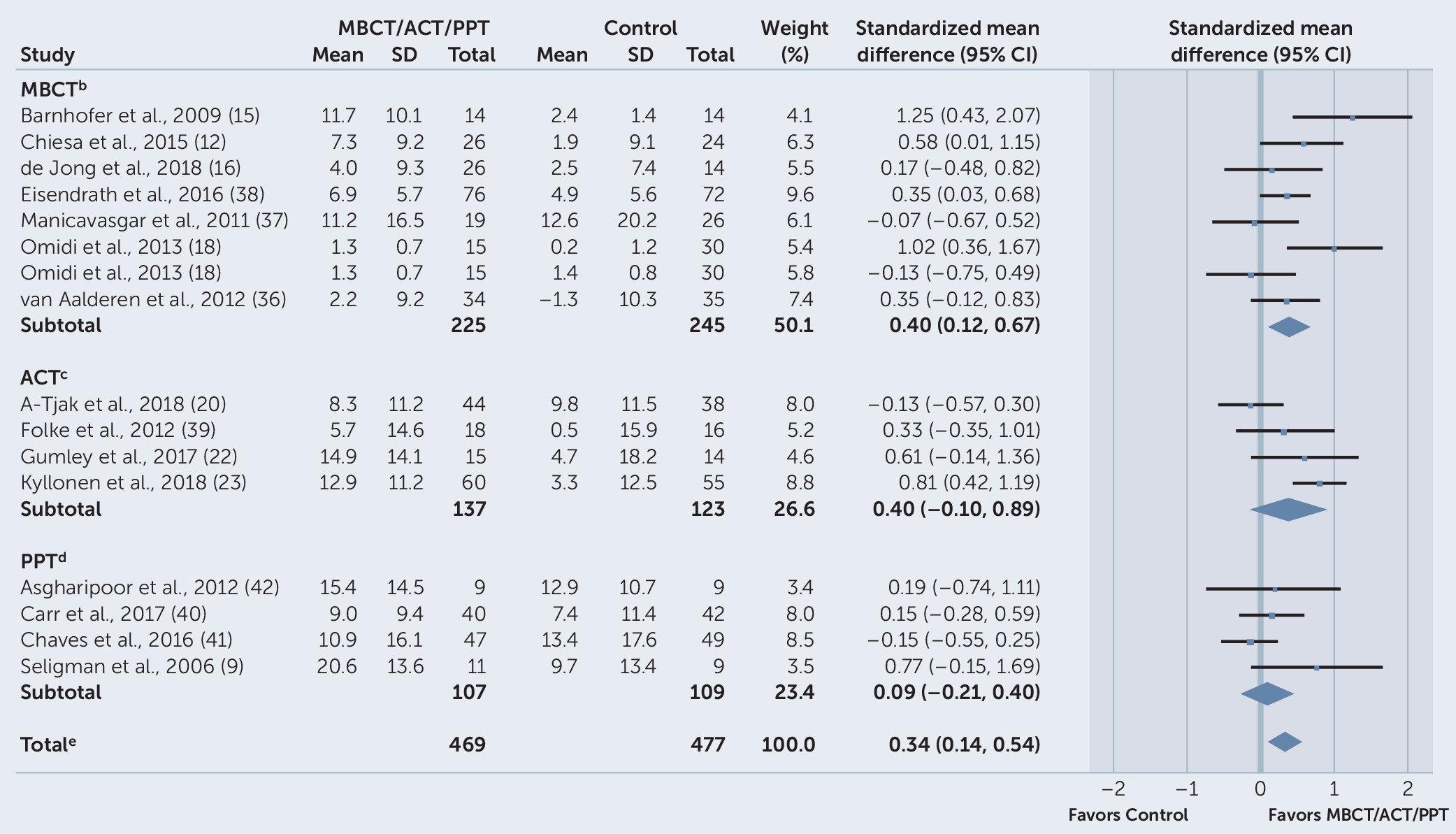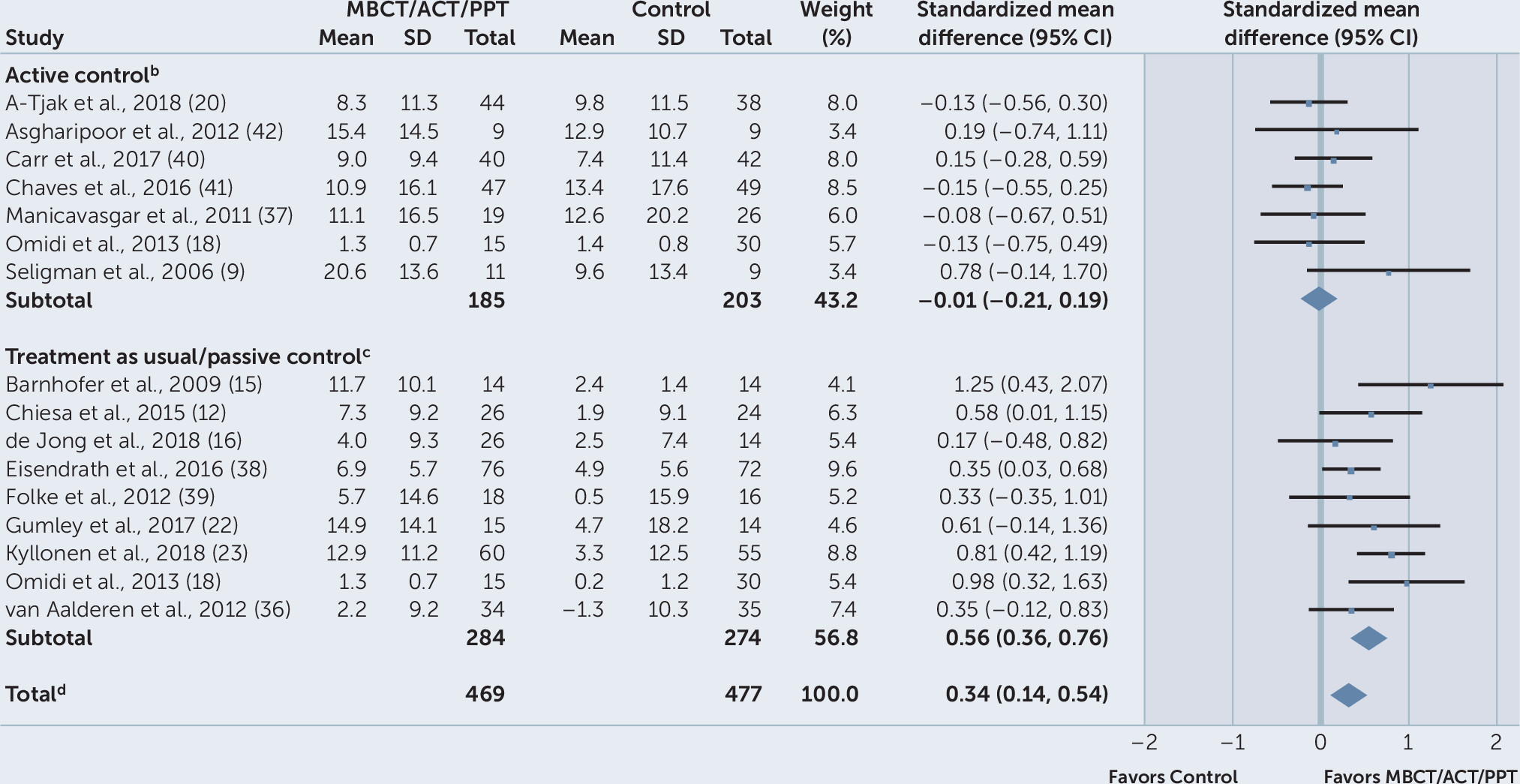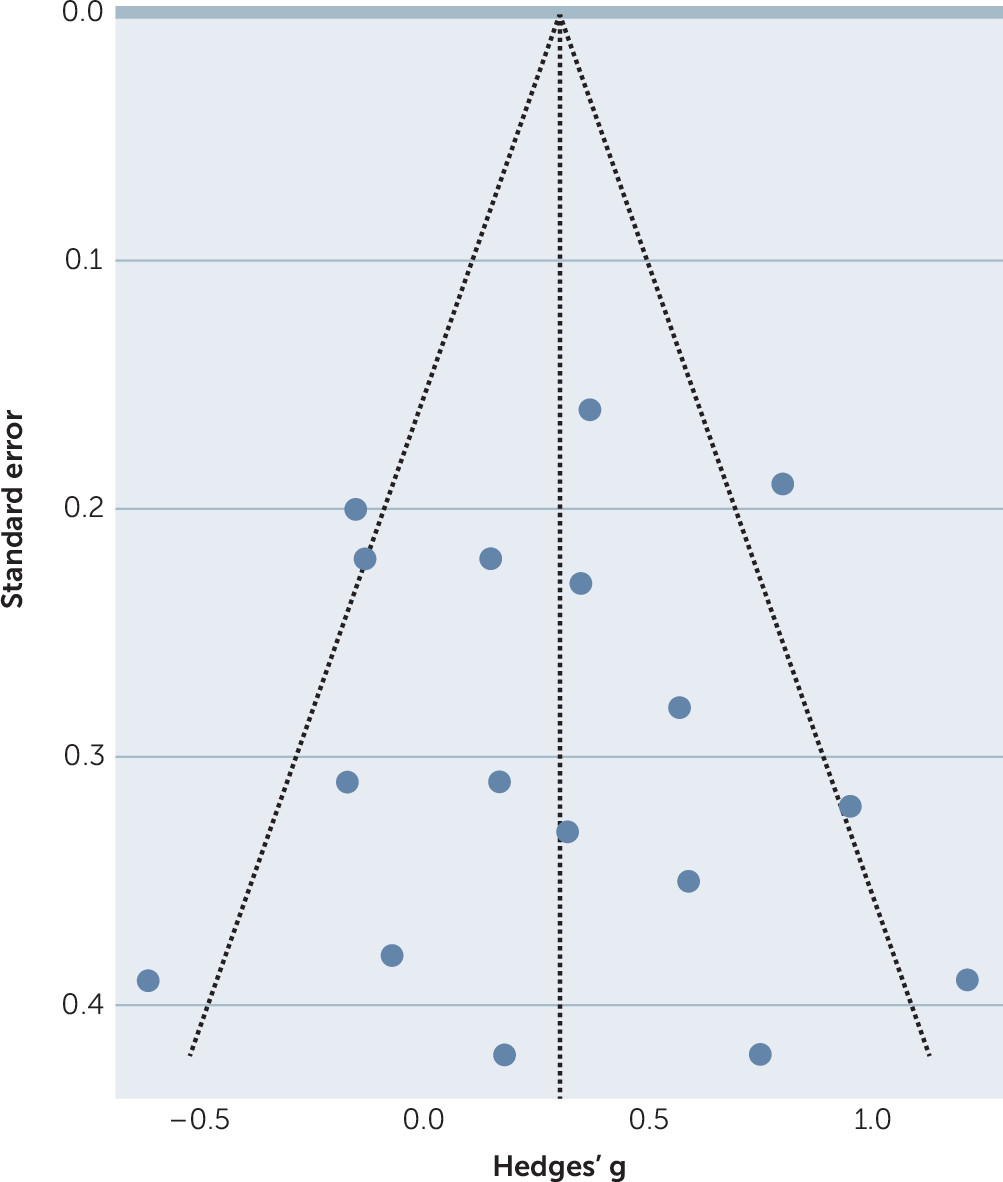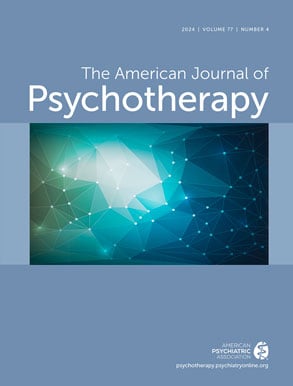Major depression is a significant health care problem due to its high prevalence and recurrence, along with high rates of suicide, loss of work productivity, and associated health care costs (
1,
2). Treatments for major depression encompass various strategies, including psychopharmacology and psychotherapy. Cognitive-behavioral therapy (CBT) and interpersonal therapy are two established psychotherapy modalities that have shown efficacy in reducing depression in multiple randomized controlled trials (RCTs) (
3,
4). CBT emphasizes the restructuring of cognition, targeting negative automatic thoughts or dysfunctional beliefs or schema to alter behavioral response (
5). Interpersonal therapy focuses on improving interpersonal relationships and social supports to improve depression (
6).
In the past two decades, newer therapies have emerged that do not attempt to change the form or content of abnormal thought but focus on changing perspectives around those thoughts. These principles form the core of two modalities: acceptance and commitment therapy (ACT) and mindfulness-based cognitive therapy (MBCT) (
7,
8). Concurrently, positive psychotherapy (PPT), a therapy founded on the principles of positive psychology, has emerged with a focus on developing positive emotions to combat depression (
9). Although MBCT, ACT, and PPT all engage metacognitive awareness in order to promote psychological flexibility, they were founded on different theoretical models and have distinct methods, as outlined below. There are other third-wave cognitive therapies, such as behavioral activation and dialectical behavioral therapy, but we focused our review on MBCT, ACT, and PPT, which focus on thought process rather than problematic thoughts or situations. The three therapies have different approaches to promoting “psychological flexibility,” a term that refers to the ability to stay in the present moment despite unpleasant thoughts, feelings, or bodily sensations while choosing behaviors based on the situation and ones’ personal values (
10).
Mindfulness can be defined as the awareness that arises from intentional, nonjudgmental attention to the present moment (
11). MBCT was developed as a structured program to help prevent relapse and recurrence in major depression with the core emphasis on development of mindfulness to achieve that goal. MBCT has shown efficacy in reducing relapse among patients with history of greater than three lifetime depressive episodes (
12). MBCT typically involves an 8-week program, sequentially introducing participants to attention training activities that include body scan exercises and meditation practices in order to increase awareness of thoughts, feelings, and body sensations. Participants are taught to recognize rumination and avoidance and cultivate acceptance while using the principles of cognitive therapy (i.e., mindfulness of thoughts and emotions, being in the moment, acceptance, and letting go), with the goal of achieving the “being” versus the “doing” state of mind (
8).
ACT was designed to promote psychological flexibility, focusing on the metacognitive processes of defusion (decentering), acceptance, mindfulness, and self as context while promoting committed values-based action for behavioral change (
7). PPT for depression was developed by Seligman et al. (
9) with the hypothesis that depression can be treated effectively by directly building positive emotions, personal strengths, and meaning. The therapy emphasizes identifying and deploying signature strengths; cultivating positive emotions, forgiveness, and gratitude; satisficing (pursuing a “good enough” outcome) instead of maximizing; and increasing emphasis on meaning.
Evidence of the efficacy of MBCT in preventing relapse among patients with recurrent major depression (
13) has led to interest in studying MBCT for treatment of current depressive episodes. A recent meta-analysis by Wang et al. (
14) showed positive effects of mindfulness-based interventions, compared with inactive treatment control conditions, in reducing depressive symptoms among patients with current depression. However, his study did not identify several RCTs of MBCT (
15–
17) for unspecified reasons and included studies with varying treatment durations. One additional RCT of MBCT for major depression has been published since that review (
18). A previous meta-analysis of mindfulness-based interventions by Strauss et al. (
19) included patients with both depressive and anxiety disorders. Previous meta-analysis of ACT compared with active control conditions for depressive symptoms has shown mixed results, with only one RCT containing a sample with major depression (
20). Metacognitive processes with committed behavioral strategies are essential tenets of ACT (
7). Considering that major depression is a syndrome associated with cognitive inefficiencies that impair cognitive reappraisal and ability to formulate coping strategies (
21), studies of ACT are needed among patients with major depression to estimate treatment efficacy with greater confidence. Since the publication of these reviews, four RCTs of ACT among participants with major depression have been published (
20,
22,
23). There is a lack of data on the efficacy of PPT studies in the treatment of a current episode of major depression. Thus, we conducted this comprehensive systematic review and meta-analysis to evaluate the efficacy of these three psychotherapies (MBCT, ACT, and PPT) for the treatment of major depression.
Methods
Data Sources and Search Strategy
A systematic search of Ovid MEDLINE, Embase, PsycINFO, and Cochrane databases from inception of the databases to the second week of March 2019 was conducted on March 11, 2019, by a professional librarian with input from three study authors (A.S., J.M., M.F.T.). The search was updated on December 2, 2019. We searched database subject headings, titles, and abstracts with search terms that included psychological adaptation, resilience, stress management/reduction, mind-body therapies, mindfulness, relaxation therapy, meditation, ACT, and positive psychology/psychotherapy for major depression. We restricted our search to RCTs published in English. Further screening based on backward citations yielded two additional studies. Our systematic review was registered with PROSPERO (CRD42018107670). We followed the PRISMA (Preferred Reporting Items for Systematic Reviews and Meta-Analyses) guidelines for conducting meta-analysis (
24).
Study Selection
Covidence (
25), an online systematic review tool, was used for title screening, full-text review, and data extraction. Title and abstract screening were done in duplicate by two independent reviewers (A.S., S.O.). Conflicts were resolved by discussion. Our inclusion criteria were RCTs with at least 6 weeks of follow-up data that compared MBCT, ACT, or PPT against any control condition, including other treatment interventions or treatment as usual, among adult patients experiencing a current episode of major depression, diagnosed by using standardized diagnostic criteria. We included studies of participants with major depression and comorbid conditions if major depression was diagnosed by using standardized diagnostic criteria and identified as the primary target of the treatment intervention. To be included in the review, MBCT, ACT, and PPT studies needed to provide adequate details of therapy content, delivery format, and duration and sufficient data to calculate effect sizes for the meta-analysis. We attempted to contact study authors when there were insufficient data. We excluded two mindfulness-based studies that used mindfulness techniques but did not conform to the MBCT manual for format or duration of therapy (
26,
27). We excluded studies in which participants reported depressive symptoms but were not formally diagnosed as having major depression and studies of participants with dysthymia (duration of depression >2 years) (
16). The primary outcome measure was change in depressive symptom severity, measured with standardized rating scales, during the treatment intervention period.
Data Extraction
Two authors (A.S., S.O.) completed full-text review in duplicate for the studies meeting inclusion criteria. Disagreements were resolved by consensus. Risk of bias assessment was completed by two independent authors (A.S., A.A.) with the Cochrane risk-of-bias tool (
28). Data were extracted by two independent reviewers (A.S., A.A.). Conflicts were resolved through discussion and consensus.
Data Synthesis and Statistical Analysis
We calculated standardized mean differences for the intervention groups for each study by using pre- and posttreatment mean±SD or 95% confidence interval (CI) and number of participants. We extracted the effect sizes if they were reported. Standardized mean difference values were calculated by using Hedges’ g instead of Cohen’s d, because the latter is known to produce biased effect estimates, particularly for smaller samples (
29). The inverse variance method was used for weighting studies of differing sample sizes. Random-effects model meta-analysis was performed to calculate overall effect sizes. One MBCT study (
17) had multiple comparison groups comprising different control interventions. We treated each comparison independently for these studies. To prevent double counting of participants, we divided the samples of common comparison groups within the study. RevMan Review Manager, version 5.3 (
30), was used to perform random-effects meta-analysis. RStudio (
31) was used to assess publication bias. Heterogeneity was assessed by using the Cochran Q statistic, and p<0.10 on the Cochran Q test was used as a cutoff to attribute heterogeneity to between-study factors rather than to chance (
32). The I
2 statistic was used to assess the contribution of between-study heterogeneity to the overall estimate of heterogeneity. We assigned cutoffs of 25%, 50%, and 75% for small, moderate, and large levels of heterogeneity between studies, respectively (
32). Subgroup analysis, based on a mixed-effects model, was conducted to further investigate heterogeneity between studies by stratifying studies according to types of intervention, comparator groups (active psychotherapy or treatment as usual/inactive control), severity of depression, and study location by continent (Europe, North America, or Australasia). Funnel plots created with the trim-and-fill method and Egger’s regression test were used to qualitatively and quantitatively assess publication bias (
33,
34).
Risk-of-Bias Assessment
The Cochrane Collaboration risk-of-bias assessment tool was used to assess bias in our study. This tool contains categories for sequence generation, allocation concealment, blinding of participants and personnel, blinding of outcome assessment, handling of incomplete data, selective reporting, and other forms of bias. Cochrane guidelines recommend that all key domains be rated low risk to qualify for a low global risk score. Even a single domain rated high risk or unclear risk confers high risk on a global scale (
28). However, blinding participants and treatment providers is inherently difficult with psychological therapies, and previous Cochrane reviews have excluded this item from psychotherapy risk-of-bias assessments (
35). We therefore excluded this item from our risk-of-bias assessment.
Results
Our search strategy resulted in 545 articles. After we removed duplicates, 386 articles were screened on the basis of title and abstract, from which 33 studies were found eligible for full-text review. Fifteen RCTs were included in the meta-analysis (
Table 1). Across seven MBCT studies (
12,
15,
17,
18,
36–
38), four ACT studies (
20,
22,
23,
39), and four PPT studies (
9,
40–
42), 469 participants were enrolled in the intervention groups, and 477 participants were enrolled in the control groups. The RCTs were conducted in Australia (N=1), Finland (N=1), Iran (N=2), Ireland (N=1), Italy (N=1), the Netherlands (N=3), Spain (N=1), Sweden (N=1), the United Kingdom (N=2), and the United States (N=2). The MBCT studies used treatment periods of 8 weeks and followed the MBCT manual developed by the creators of the program. ACT studies varied in treatment duration between 6 and 30 weeks (mean±SD=15.5±11.7 weeks). PPT studies used 10- to 12-week intervention periods. The Hamilton Rating Scale for Depression (
43) and Beck Depression Inventory (
44) were the most common outcome measures (used in six and seven studies, respectively). The study population was predominantly female (N=574, 67%), with a mean age of 43 years. Nine RCTs included participants with a moderate depressive episode, four studies included persons with severe depression, and one included participants with mild depression, based on baseline outcome measure scores. One RCT recruited a sample with treatment-resistant depression. In terms of control groups, six studies had inactive/treatment-as-usual groups, seven studies had control groups that received psychotherapy, and two studies had control groups that were allocated to active psychoeducation.
Risk of Bias in Included Studies
Risk of bias was assessed with Cochrane risk-of-bias criteria (
Table 2). Seven RCTs provided details of random assignment methods in their reports. Five studies were rated as having high risk of selection bias on the basis of allocation concealment, and four studies were rated as having unclear risk. The risk of detection bias was rated unclear or high for eight RCTs. Given that the intervention was psychotherapy, blinding of participants and personnel was not possible, making the risk of bias inherently high, more so when the control intervention was a passive or treatment-as-usual condition. Attrition and selective reporting bias were low for all except two RCTs that did not employ intention-to-treat analysis (
9,
37). Other sources of bias came from small underpowered samples (N=7 studies), confounding bias (
18,
23,
42), and choice of outcome measures (
17). Overall, only one of the 15 studies (
38) qualified as a high-quality study across all risk-of-bias criteria.
Effects of Interventions on Depression
A random-effects model meta-analysis revealed that MBCT, ACT, and PPT, taken together, showed a small favorable effect in reducing depression symptoms compared with all control conditions, applying Cohen’s cutoff criteria (
45) (small, 0.2; moderate, 0.5; large, 0.8) for effect sizes (N=946; Hedges’ g=0.34; 95% CI=0.14, 0.54; p<0.001) (
45). Cochrane’s Q statistic (Q=32, df=15, p=0.007) suggested significant heterogeneity. The I
2 statistic indicated that 53% of the variance was accounted for by between-study differences in effect size. Subgroup analysis revealed that the type of control, whether active control (I
2=0%) or treatment as usual/passive control (I
2= 20%), may have contributed significantly to overall heterogeneity (I
2= 53%).
MBCT.
Seven RCTs of MBCT compared with a control condition were included in the meta-analysis (see PRISMA chart in the online supplement). Compared with participants in the control groups, those receiving the mindfulness-based interventions showed an overall small significant improvement in depressive symptoms at the end of the intervention period (N=470; Hedges’ g=0.40; 95% CI=0.12, 0.67; p=0.005). There was overall low heterogeneity (Q=13, df =7, p=0.06), with small to moderate variance due to between-study differences in effect size (I2=49%).
ACT.
Meta-analysis of four RCTs of ACT with four treatment arms showed that ACT was comparable to control conditions in improving depression outcomes (N=260; Hedges’ g=0.40; 95% CI=–0.10, 0.90; p=0.12). There was significant heterogeneity (Q=10.4, df =3, p=0.02) with significant variance due to between-study differences in effect size (I2=71%).
PPT.
Meta-analysis of four RCTs comparing PPT with controls of active psychotherapy (CBT, N=2; individual therapy, N=2) showed comparable outcomes in reducing depression between the two groups (N=216; Hedges’ g=0.09; 95% CI=–0.21, 0.40; p=0.55), with overall low heterogeneity (Q=3.6, df=3, p=0.31, I2=16%).
On subgroup analysis (
Figure 1 and
Figure 2), MBCT, ACT, and PPT combined were significantly superior to treatment-as-usual groups (N=558; Hedges’ g=0.56; 95% CI=0.36, 0.76; p<0.001). However, they were not superior to active therapy control groups (N=388; Hedges’ g=–0.01; 95% CI=–0.21, 0.19; p=0.93). A mixed-effects model test for subgroup differences based on type of control showed significant differences between active and treatment-as-usual controls (χ
2=15.35, df=1, p<0.001). Subgroup analysis based on severity of baseline depression showed superior effects of MBCT, ACT, and PPT compared with control conditions among patients with moderate depression (N=695; Hedges’ g=0.27; 95% CI=0.04, 0.50; p=0.02), whereas there were no significant differences among patients with mild (N=69; Hedges’ g=0.35; 95% CI=–0.12, 0.83; p= 0.14) and severe depression (N=198; Hedges’ g=0.34; 95% CIs=–0.25, 0.93; p=0.26). Subgroup analysis based on continents where the studies were performed did not show any significant differences (χ
2=0.46, df=2, p=0.80). Subgroup analysis of three studies of PPT compared with CBT showed no difference between the two modalities (N=196; Hedges’ g=0.01; 95% CI=–0.27, 0.29; p=0.95).
Publication Bias
Using a funnel plot with the trim-and-fill method and Egger’s regression test (intercept=0.79; 95% CI=–1.72, 3.3; p=0.54) for qualitative and quantitative assessment of publication bias showed no significant concerns with reporting bias (
Figure 3).
Discussion
Summary of Main Results
This meta-analysis showed that MBCT and ACT may be superior to treatment-as-usual control conditions and that PPT may be comparable to CBT in reducing depressive symptoms among patients with a current depressive episode. However, the evidence is limited by a paucity of high-quality, adequately powered RCTs. Our meta-analysis did not have adequate power to detect statistically significant differences across the therapy modalities.
Completeness and Applicability of Evidence
This review systematically searched the published literature in English for RCTs of MBCT, ACT, and PPT in the treatment of a current episode of major depression. Included studies used standardized assessment criteria to diagnose major depression. Assessment for publication bias showed no significant concerns. This meta-analysis included 15 RCTs with a combined sample size of 946 participants, including 470 in MBCT studies, 260 in ACT studies, and 216 in PPT studies.
Quality of the Evidence
Nine (60%) studies in this meta-analysis showed significant risk of selection bias on the basis of high or unclear risk related to sequence generation or allocation concealment. Performance detection bias was rated high or unclear in eight (53%) studies. Considering the nature of psychotherapy interventions, blinding of participants or personnel conducting psychotherapy intervention was not possible. Thirteen (87%) studies used good outcome reporting standards and were rated as having low risk of attrition and reporting bias. Overall, only one study qualified as high quality across all criteria.
Agreements and Disagreements With Other Studies or Reviews
Wang et al.’s (
14) 2018 meta-analysis of mindfulness-based studies reported that mindfulness-based interventions had positive treatment effects for a current episode of major depression compared with treatment-as-usual control groups but not compared with active control groups. Prior meta-analyses of MBCT have focused on a broader spectrum of psychiatric disorders (
12,
19). Compared with Wang et al., we identified four additional RCTs and established criteria for duration of follow-up as ≥6 weeks to allow for more accurate estimation of effect on depressive symptoms during a depressive episode. However, our study findings were consistent with the previous findings of the positive effect of MBCT in improving depression compared with inactive control conditions.
Implications for Practice
MBCT, ACT, and PPT represent promising additions to the currently available armamentarium of psychotherapies. Our study showed the superior performance, with large effect sizes, of MBCT and ACT compared with inactive control conditions. Heterogeneity between studies was explained by the type of control condition being compared with each therapy. Considering that inactive control conditions cause inherent problems with introducing bias, these results should be interpreted with caution. However, we identified one high-quality study that showed a significant difference in depression outcome between MBCT and an active health education control condition in a sample of patients with treatment-resistant depression (
38). Overall, there is inadequate high-quality evidence to compare MBCT, ACT, and PPT with established psychotherapies. PPT demonstrated comparable response to CBT in three studies, showing promise but needing replication in more high-quality RCTs. Overall, the inadequate quality of the studies in this meta-analysis suggests significant risk of bias and underscores the need for cautious interpretation and application to clinical practice.
Implications for Research
Future studies of MBCT, ACT, and PPT should focus on research methodologies that utilize control groups with evidence-based therapies and/or active attention-controlled comparisons. Larger adequately powered studies are needed to confirm early findings from the current body of studies. Longer-term follow-up duration would help to determine whether the acute improvement noted could be maintained to prevent depressive relapse.
Limitations
Although our search strategy included multiple databases, we restricted our search to articles published in English, likely limiting the number of studies on this subject. We have provided a list of reasons for excluding studies, but we have not provided a list of excluded studies. Although we used the Cochrane risk-of-bias tool, we did not provide a summative score.
Conclusions
The current meta-analysis of studies of MBCT, ACT, and PPT found that MBCT and ACT may be superior to treatment as usual or inactive controls for reducing depressive symptoms of major depression following an acute course of therapy. PPT may be comparable to CBT in reducing depressive symptoms of major depression. However, the quality of the evidence is low, suggesting that caution should be exercised in drawing firm conclusions of the efficacy of these therapies to treat a major depressive episode. High-quality studies are needed to confirm the efficacy of these interventions.
Acknowledgments
The authors thank librarians Ann Ferrel and Larry Prokop, who helped with the literature search, and Lori Solmonson for help with manuscript preparation.




